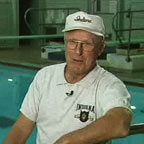 Hobie
Billingsley was born and raised in Erie, Pennsylvania. When he was in high
school, Ohio State swimming coach Mike Peppe and his great national champion,
Al Patnik, visited Erie to give an exhibition at the state high school meet.
Patnik,
who was Hobie's hero, signed his autograph, and Peppe told Hobie he would make
him into a national champion. At that time, if you wanted to become a
great diver, there was only one place to go: Ohio State. Hobie became a Buckeye.
Hobie
Billingsley was born and raised in Erie, Pennsylvania. When he was in high
school, Ohio State swimming coach Mike Peppe and his great national champion,
Al Patnik, visited Erie to give an exhibition at the state high school meet.
Patnik,
who was Hobie's hero, signed his autograph, and Peppe told Hobie he would make
him into a national champion. At that time, if you wanted to become a
great diver, there was only one place to go: Ohio State. Hobie became a Buckeye.
Billingsley also became one the most important and influential personalities in the history of diving, first as a competitor/performer, then as a coach. He was an NCAA Champion on the one- and three-meter boards at Ohio State, and for fifteen years he toured the U.S.A. and foreign lands putting on water and trampoline shows, first with the late Bruce Harlan, then with Dick Kimball. In 1964 he retired from the water shows to start a diving camp at Indiana University, where he became the second person hired as a diving coach on the college level. His camp was active for 25 years.
Although he was a wonderful performer, Hobie earned his lasting reputation as one of the greatest diving coaches in history. He was always a student of the sport and early in his career he applied the scientific approach to coaching, incorporating the mechanical principals based on Sir Isaac Newton's Laws of Motion. For more than four decades, Hobie has traveled the world lecturing, presenting clinics, and conducting camps for coaches and divers.
Hobie came to Indiana University in 1959 and carried the swimming tradition over to diving. Throughout his 30-year stint as head diving coach, his divers won 115 national titles. Twenty-one of his divers were on Olympic teams, winning three gold and three bronze medals. Hobie's divers also won five Pan American gold medals, 28 NCAA titles and 25 Big Ten championships. Among his great divers are Cynthia Potter, a bronze medal Olympian who holds the women's record for American national championships at 28; Olympic gold medallists Lesley Bush, Kenny Sitzberger and Mark Lenzi; bronze medallists Win Young and Jim Henry; and his first national champion, 1968 Olympian Rick Gilbert.
Hobie has been named the National Siving Coach of the Year by the American Swimming Coaches Association, was the first recipient of the NCAA Coach of the Year in 1988, and he was inducted into the International Swimming Hall of Fame in 1983. In 1994 he was presented with the Sammy Lee Award, the most prestigious award in the world for contributions to the sport of diving.
Hobie was a five time Olympic coach and had the honor of reciting the Olympic Oath at the 1996 Olympics in Atlanta before a packed stadium and several billion-television viewers. He has written three books and numerous articles about diving.
In spite of all the honors and achievements, Hobie believes his greatest contribution to the world of diving is in the forming of the World Diving Coaches Association in 1968 and the American Diving Coaches Association in 1971. Forming these two associations and gathering all the coaches together helped to develop friendships and created the opportunity to exchange ideas, concepts, and philosophies, all of which permitted the sport to grow.